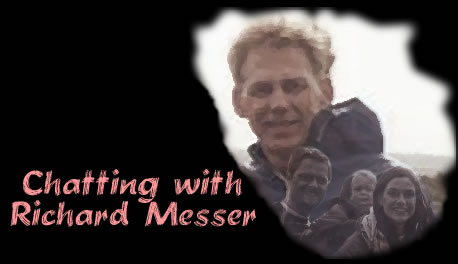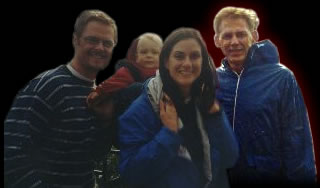![]()
 |
This issue we are talking with author and professor Richard Messer about poetry, grief, healing, and Murder In the Family. We are honored to share Richard's words here and throughout the Poetry Journal as we feature six of his poem including It Isn't Fair, The Clothes of the Dead, Murder Entertains Us, The End of the Second Year, Fathering, and Look Around You.
Q. What does poetry mean to you?
A. I put myself into life as a poet. I find beauty and meaning in it and it seems to me a natural response to being alive.
To me, poetry brings healing, personal healing and tribal healing. It does this because it creates meaning though beauty, no matter what one's definition of beauty may be. It helps me to integrate my experience of being alive, of sharing life with you and the rest of creation.
As I see it, poetry is a path to individuation in the Jungian sense. Through writing we individuate, we come into fuller realization of our individuality. No matter how personal the imagery of our poetry, the drama it describes on our inner stage often enacts the general human drama as well. In its imaging of the experience of the "tribe", it helps a culture identify itself, its values, and its destiny.
Q. When and why did you start writing poetry?
A. I began writing poetry when I was 17 or 18, I loved the word magic of someone like Dylan Thomas, yet, I also responded to the likes of Rexroth and Ginsberg and Plath.
Q. How has the poetic process influenced your grieving and healing process?
A. I don't want to argue over terms, but its seems to me the word process is overused these days. It has begun to take on connotations, as in food processing, cheese spread, etc., of homogenizing and devitalizing. Let's go with the image of poet as alchemist-- what happens in the writing of a poem is that one alchemically transforms the raw emotional materials of an event, through the rhythm and imagery of language, into feeling and statement. This is the same thing that happens when one deals with a trauma. One gradually works the emotional/bodily memory of the event into a meaningful experience, integrates it into the story of one's life.
I make a distinction between event and experience. This distinction becomes clear if you compare, for instance, a newspaper piece or a sociologist's report on the victimization of a young black girl and Tony Morrison's The Bluest Eye. If events happen to you and you have no perspective on them and disassociate from them, then you are victimized by them. Writing about the event, cooking it in various ways, integrates it into your life, makes it part of your story, puts who you are now into relationship with who you were then and -- as in the famous metaphor for healing-- the event or storm does not change, it happened and doesn't unhappen, but now you have perspective on it, and instead of being in the fury of the storm you are looking down on it from higher on the mountain.
From another angle one could say that the "real" is always only a subjective construct. Working responsibly and imaginatively with our inner and outer experience is a means to seeing ourselves and our lives more fully and not just through the very narrow slits offered by our culture.
Q. Does being
a Writing Professor help in your personally healing as well as
it being a professional choice for you?
A. I don't think teaching creative writing in a university setting has particularly to do with my healing or my students' healing.
In one sense, most of life is about healing. We enter the world through the so called birth trauma and healing from this and the constant impact of material reality goes on continually and naturally. This is what Baudelaire was referring to when he said that life is a hospital where all the patients constantly yearn to trade beds, and it is what John Keats meant when he said that life is a veil, not of tears, but of soul making.
University writing classes are by and large literary or commercial. They teach one to be a literary artist or a professional writer, for TV, let's say, or to hopefully author a best seller. Both of these aims are fine; I feel the so called literary mode and the professional genres mode are of equal value. But I feel that in either mode the writer's work is often devitalized because it is done not for its own sake but for the ego rewards offered by a certain audience. I think that writing is best when it is done as a practice, like music, or meditation, or martial arts or gardening. Such practice incorporates the notion of the writer as an artist who writes for herself or himself and in doing so writes for the culture at large, but is not caught up in the big rewards game of best sellers, prizes and fame, a la the rock star image.
Q. Can you
say a few words about what you are offering to readers who read
your book "Murder In The Family"?
A. Solidarity with those who have and are suffering. What I say at the end of that book is still true for me.
"Those who survive trauma and heal and go on to thrive reach out to those who are in the midst of their suffering. Tragedy teaches what intuition always whispers-- there is a realm in which we are all present to each other, we are one in the deep heart's core. We mourn for those who die and we move on through the knowledge that what has happened to them, no matter how brutal or tragic, does not define them, or us. Our spirits and souls tell us who we are and give our lives their meaning."
Q. Where are you today in your poetry career?
A. I am getting a second book ready, tentatively titled, "Resurrection Blues". I feel generally that most writing in the paper literary journals is careerist and I do most of my publishing these days online.
| |
